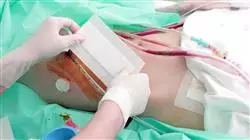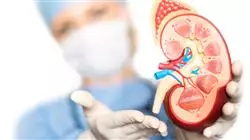University certificate
The world's largest faculty of nursing”
Introduction to the Program
Improve your knowledge through this program, where you will find the best didactic material with real clinical cases. Learn here about the latest advances in the specialty to be able to perform a quality nursing practice"

Nursing plays a decisive role in the care of the patient with chronic kidney disease, both from its onset and in later stages. In addition to skills in renal replacement techniques such as the acquisition of specific professional competencies, specific and quality care is required in the various studies of renal disease.
The care of the nephrological patient, including renal function replacement techniques, has made significant advances in recent years, both in renal transplantation and in the health care of the nephrological patient, requiring specialized and continuous training for Nursing. Such specialized training is rarely found in standard curricular training, so many nurses are unaware of important aspects of caring for these patients. Training in this sense is necessary to guarantee a minimum quality of care.
Increase your competencies in the approach to Renal Transplantation for Nursing through this program"
This Postgraduate diploma in Renal Transplantation for Nursing contains the most complete and up-to-date scientific program on the market. The most important features include:
- Development of clinical cases presented by experts in nephrology nursing. The graphic, schematic, and eminently practical contents with which they are created provide scientific and practical information on the disciplines that are essential for professional practice
- Diagnostic and therapeutic developments on the performance of Renal Transplantion for Nursing
- Algorithm-based interactive learning system for decision-making in the presented clinical situations
- With a special emphasis on evidence-based medicine and nursing research methodologies in the renal patient
- All this will be complemented by theoretical lessons, questions to the expert, debate forums on controversial topics, and individual reflection assignments
- Content that is accessible from any fixed or portable device with an Internet connection
This Postgraduate diploma may be the best investment you can make in the selection of a refresher program for two reasons: in addition to updating your knowledge in Renal Transplantation for Nursing, you will receive a certificate from TECH Global University"
Its teaching staff includes health professionals belonging to the field of nephrological nursing, who contribute their work experience to this training, as well as renowned specialists belonging to leading scientific societies.
The multimedia content developed with the latest educational technology will provide the professional with situated and contextual learning, i.e., a simulated environment that will provide an immersive training program to train in real situations.
This program is designed around Problem Based Learning, whereby the physician must try to solve the different professional practice situations that arise during the course. This will be done with the help of an innovative interactive video system developed by recognized experts in the field of nephrology nursing with extensive teaching experience.
This program offers training in simulated environments, which provides an immersive learning experience designed to train for real-life situations"

It includes clinical cases to bring the program's degree as close as possible to the reality of care in Nursing"
Why study at TECH?
TECH is the world’s largest online university. With an impressive catalog of more than 14,000 university programs available in 11 languages, it is positioned as a leader in employability, with a 99% job placement rate. In addition, it relies on an enormous faculty of more than 6,000 professors of the highest international renown.

Study at the world's largest online university and guarantee your professional success. The future starts at TECH”
The world’s best online university according to FORBES
The prestigious Forbes magazine, specialized in business and finance, has highlighted TECH as “the world's best online university” This is what they have recently stated in an article in their digital edition in which they echo the success story of this institution, “thanks to the academic offer it provides, the selection of its teaching staff, and an innovative learning method aimed at educating the professionals of the future”
A revolutionary study method, a cutting-edge faculty and a practical focus: the key to TECH's success.
The most complete study plans on the university scene
TECH offers the most complete study plans on the university scene, with syllabuses that cover fundamental concepts and, at the same time, the main scientific advances in their specific scientific areas. In addition, these programs are continuously being updated to guarantee students the academic vanguard and the most in-demand professional skills. In this way, the university's qualifications provide its graduates with a significant advantage to propel their careers to success.
TECH offers the most comprehensive and intensive study plans on the current university scene.
A world-class teaching staff
TECH's teaching staff is made up of more than 6,000 professors with the highest international recognition. Professors, researchers and top executives of multinational companies, including Isaiah Covington, performance coach of the Boston Celtics; Magda Romanska, principal investigator at Harvard MetaLAB; Ignacio Wistumba, chairman of the department of translational molecular pathology at MD Anderson Cancer Center; and D.W. Pine, creative director of TIME magazine, among others.
Internationally renowned experts, specialized in different branches of Health, Technology, Communication and Business, form part of the TECH faculty.
A unique learning method
TECH is the first university to use Relearning in all its programs. It is the best online learning methodology, accredited with international teaching quality certifications, provided by prestigious educational agencies. In addition, this disruptive educational model is complemented with the “Case Method”, thereby setting up a unique online teaching strategy. Innovative teaching resources are also implemented, including detailed videos, infographics and interactive summaries.
TECH combines Relearning and the Case Method in all its university programs to guarantee excellent theoretical and practical learning, studying whenever and wherever you want.
The world's largest online university
TECH is the world’s largest online university. We are the largest educational institution, with the best and widest online educational catalog, one hundred percent online and covering the vast majority of areas of knowledge. We offer a large selection of our own degrees and accredited online undergraduate and postgraduate degrees. In total, more than 14,000 university degrees, in eleven different languages, make us the largest educational largest in the world.
TECH has the world's most extensive catalog of academic and official programs, available in more than 11 languages.
Google Premier Partner
The American technology giant has awarded TECH the Google Google Premier Partner badge. This award, which is only available to 3% of the world's companies, highlights the efficient, flexible and tailored experience that this university provides to students. The recognition as a Google Premier Partner not only accredits the maximum rigor, performance and investment in TECH's digital infrastructures, but also places this university as one of the world's leading technology companies.
Google has positioned TECH in the top 3% of the world's most important technology companies by awarding it its Google Premier Partner badge.
The official online university of the NBA
TECH is the official online university of the NBA. Thanks to our agreement with the biggest league in basketball, we offer our students exclusive university programs, as well as a wide variety of educational resources focused on the business of the league and other areas of the sports industry. Each program is made up of a uniquely designed syllabus and features exceptional guest hosts: professionals with a distinguished sports background who will offer their expertise on the most relevant topics.
TECH has been selected by the NBA, the world's top basketball league, as its official online university.
The top-rated university by its students
Students have positioned TECH as the world's top-rated university on the main review websites, with a highest rating of 4.9 out of 5, obtained from more than 1,000 reviews. These results consolidate TECH as the benchmark university institution at an international level, reflecting the excellence and positive impact of its educational model.” reflecting the excellence and positive impact of its educational model.”
TECH is the world’s top-rated university by its students.
Leaders in employability
TECH has managed to become the leading university in employability. 99% of its students obtain jobs in the academic field they have studied, within one year of completing any of the university's programs. A similar number achieve immediate career enhancement. All this thanks to a study methodology that bases its effectiveness on the acquisition of practical skills, which are absolutely necessary for professional development.
99% of TECH graduates find a job within a year of completing their studies.
Postgraduate Certificate in Renal Transplantation for Nurses
Renal transplantation is a surgical procedure that involves replacing a diseased or dysfunctional kidney with a healthy one from a compatible donor. This procedure is essential for many people with chronic kidney disease, as, it allows them to regain normal kidney function and improve their quality of life. Nurses play a crucial role in this area, as they are responsible for providing comprehensive care to ensure the patient's safety and well-being. If you are looking for a program that will provide you with the knowledge required to specialize in this field, you have come to the right place. The Postgraduate Certificate in Renal Transplantation for Nurses created by TECH Global University is a virtual program of high curricular category, focused on providing you with the necessary tools to Professional Master's Degree the aspects demanded by this health field. Through our innovative classes, you will learn the ethics and legislation related to organ donation and renal transplantation, covering the donation and transplantation process, as well as the laws or policies that govern patient care and decision-making related to transplantation.
Be an Postgraduate Certificate in kidney transplantation
Only at TECH will you find the most up-to-date methods in the industry, complemented by multimedia material and dynamic classes that are completely new. During the Postgraduate Certificate of the program, you will access content related to the basic concepts of renal physiology and disorders that can affect renal function. Here, you will learn the principles of preoperative preparation, patient selection for renal transplantation and postoperative care. In addition, you will delve into aspects related to comprehensive patient care, addressing renal function monitoring, identification of signs or symptoms of organ rejection and administration of immunosuppressive therapies. Through this, you will be able to manage common complications associated with renal transplantation, including infection, hypertension and graft dysfunction.







